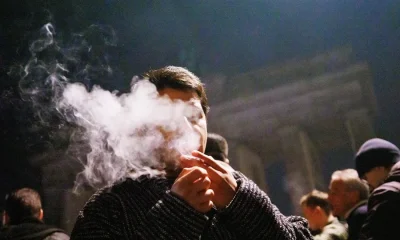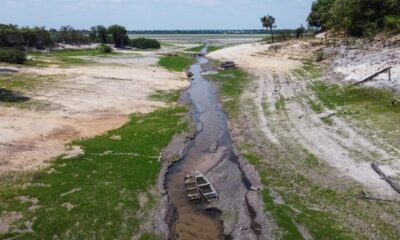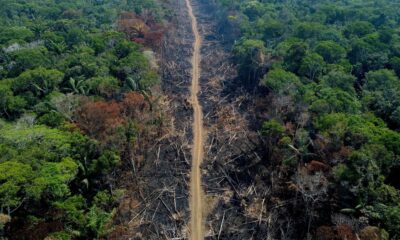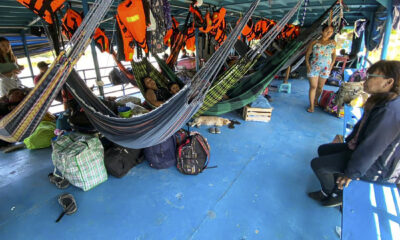International
Germany vows millions for Amazon as Scholz meets Lula in Brazil
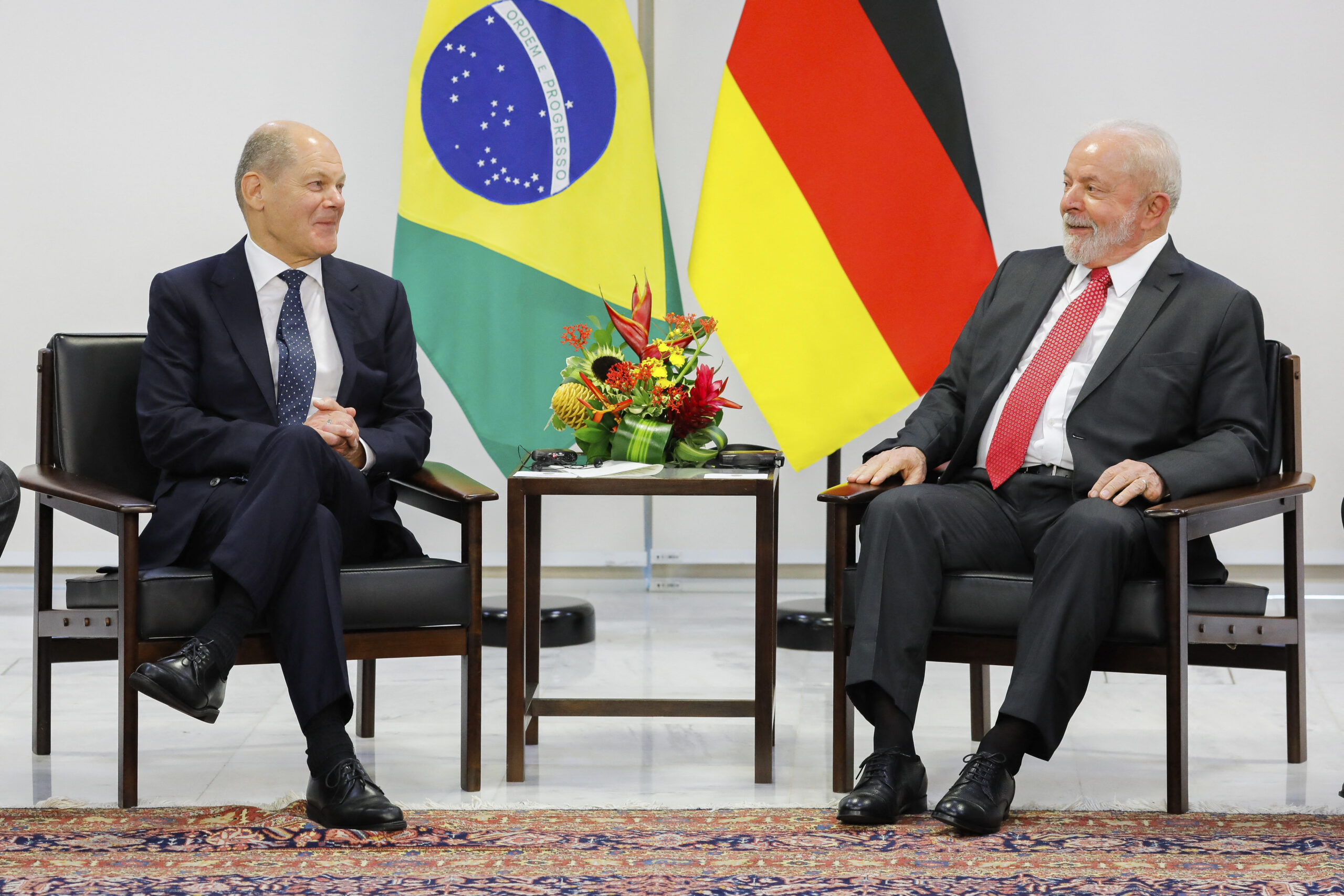
January 31 | By AFP |
Germany on Monday outlined more than $200 million in contributions for environmental projects in Brazil as Chancellor Olaf Scholz visited the South American giant reeling from Amazon destruction under ex-president Jair Bolsonaro.
The package includes a brand-new $33.6 million in aid for Brazilian states for rainforest protection, on top of another $38 million already announced for an Amazon protection fund to which Germany and Norway had halted payments under climate-skeptic Bolsonaro.
Protection of the Amazon — a crucial sink for planet-warming carbon dioxide — was high on the agenda for talks between Scholz and Brazil’s leftist new President Luiz Inacio Lula da Silva that also aimed to “deepen the resumption of relations,” according to the Brazilian presidency.
Scholz was the first German chancellor to visit Brazil since 2015, and the first Western leader to meet Lula since he became president on January 1 after four years of frosty relations with Brazil under far-right Bolsonaro.
Shortly before Scholz’s arrival in the capital Brasilia, German economic cooperation minister Svenja Schulze announced her country would make additional funds available for Amazon preservation after “difficult years”.
“Brazil is the lung of the world. If it has problems, we all have to help it,” Schulze said at a press conference in Brasilia with Lula’s new environment minister Marina Silva.
Bolsonaro’s four-year term was marked by a surge in fires and clear-cutting in the rainforest.
Average annual deforestation on his watch rose by 59.5 percent from the previous four years, and by 75.5 percent from the previous decade, according to government figures.
German funds for Brazil would also include $32 million for energy efficiency projects for small and medium companies, $9.7 million for “sustainable supply chain projects,” $5.7 million for renewable energy use in industry and transport and $14.2 million for reforestation of degraded areas, according to a Germany embassy statement.
$87 million would go towards low-cost loans for farmers to “reforest their land.”
Amazon destruction was a major sticking point in a trade deal between the European Union and the Mercosur grouping comprised of Argentina, Brazil, Paraguay and Uruguay.
The blocs reached an agreement in 2019 following 20 years of talks, but it has not yet been ratified.
‘Very interesting partners’
Scholz, who visited Chile and Argentina before heading to Brazil, said in Buenos Aires on Saturday a “quick conclusion” was needed to the trade deal impasse, adding that with Lula in place, “we are in a better position.”
Lula had presided over a sharp drop in deforestation when he previously led Brazil from 2003 to 2010, and has vowed to reboot environmental protection.
He has said it was “urgent” for a deal to be concluded, but stressed on the campaign trail that further negotiation was needed to ensure Brazil can pursue “our interest in reindustrializing.”
Energy is also on the agenda for talks between the leaders of Europe and South America’s biggest economies.
German business is seeking new opportunities overseas following the economic shock caused by Russia’s invasion of Ukraine, and as concerns grow about reliance on China.
All three countries on Scholz’s itinerary — Argentina, Chile and Brazil — are rich in natural resources and “very interesting partners,” a government source in Berlin said.
In an interview Saturday with the Grupo de Diarios America (GDA) consortium of South American newspapers, Scholz said Germany wanted to boost cooperation with Latin America and the Caribbean on “renewable energies, green hydrogen and responsible trade in raw materials.”
A Berlin government source said Germany would use the Latin American tour to drum up further international support against Moscow as the war in Ukraine drags on.
Argentina, Chile and Brazil have criticized the invasion of Ukraine at the United Nations but have not adopted sanctions against Moscow.
Lula caused shock last year when he said Ukrainian President Volodymyr Zelensky was “as responsible as” Russian President Vladimir Putin for the conflict.
International
Trump Floats “Friendly Takeover” of Cuba Amid Rising Tensions

U.S. President Donald Trump said Friday that his administration is considering what he described as a “friendly takeover” of Cuba, as Washington continues to increase pressure on the island’s communist government.
“The Cuban government is talking to us and they have very serious problems, as you know. They have no money, they have nothing at this moment, but they are talking to us and maybe we will see a friendly takeover of Cuba,” Trump told reporters as he departed the White House for a trip to Texas.
Earlier in the week, U.S. Secretary of State Marco Rubio said Cuba needed a “radical change,” shortly after Washington eased restrictions on oil exports to the island for what officials described as “humanitarian reasons,” amid a deep economic crisis.
The United States has imposed an energy blockade on Cuba since January, citing what it calls an “extraordinary threat” posed by the communist-run island, located roughly 150 kilometers (90 miles) off the coast of Florida, to U.S. national security.
International
Argentina’s Senate Reviews Milei-Backed Labor Overhaul

Argentina’s Senate on Friday began reviewing the Labor Modernization Law promoted by the administration of President Javier Milei, a proposal that would significantly reshape labor rules across the country.
The upper chamber opened its final discussion of the contentious initiative, which revises the method used to calculate severance payments — lowering the amounts owed in dismissal cases — and introduces an “hour bank” mechanism that allows overtime to be offset with paid leave rather than extra wages.
The legislation also broadens the classification of essential services, a change that would place new limits on the right to strike in designated sectors.
The bill was initially approved by the Senate on February 11 and then moved to the Chamber of Deputies, where lawmakers passed it with amendments. It has now returned to the Senate for definitive approval.
Outside the Congress building in Buenos Aires, workers, trade unions and left-wing organizations staged demonstrations beginning at midday. The gathering later thinned out amid reports of disturbances and a strong police presence. Security forces had secured the area surrounding the legislature since early morning hours.
Union leaders contend that the reform weakens labor protections, while many business representatives back the measure but stress that sustainable formal employment will require economic expansion, improved credit conditions, greater investment and a more dynamic domestic market.
International
Federal Judge Blocks Trump Policy Allowing Deportations to Third Countries

A federal judge ruled on Wednesday that the policy of U.S. President Donald Trump’s administration allowing immigration authorities to deport foreign nationals to third countries without prior notice or the opportunity to object is unlawful. The decision marks another legal setback for the administration on immigration matters.
Judge Brian Murphy of the U.S. District Court for the District of Massachusetts struck down the regulation issued last year, which stated that Immigration and Customs Enforcement (ICE) was not required to notify migrants if they were to be sent to countries other than the one listed in their removal order, provided that receiving nations offered assurances they would not face persecution or torture.
Murphy ordered the measure vacated but granted a 15-day delay before the ruling takes effect, giving the Trump administration time to file an appeal.
In his decision, the judge concluded that the policy violates federal immigration law and migrants’ due process rights. He also questioned the lack of transparency surrounding the alleged assurances provided by receiving countries, stating that “no one really knows anything about these supposed ‘assurances.’” He added, “It is not right, and it is not lawful.”
The ruling follows several legal disputes involving deportations to third countries. Last year, the executive branch deported more than 200 Salvadorans to a maximum-security prison in El Salvador, invoking an old wartime law. The White House also held talks with Costa Rica, Panama, and Rwanda about receiving migrants who are not citizens of those countries.
In May, the same judge determined that the government violated a court order when it attempted to remove a group of immigrants with criminal records to South Sudan without prior notice or an opportunity to raise claims of fear of persecution.
Although President Donald Trump took the case to the U.S. Supreme Court, which temporarily allowed the deportations to resume while a final decision was pending, the White House is expected to again appeal to higher courts to overturn this latest judicial ruling.
-

 International3 days ago
International3 days agoFamily of “El Mencho” Seeks Return of Body After Deadly Military Operation
-

 International3 days ago
International3 days agoLarry Summers Steps Down from Harvard Role Amid Epstein Controversy
-

 International3 days ago
International3 days agoIran’s President Optimistic Ahead of Geneva Nuclear Talks with U.S.
-

 International3 days ago
International3 days agoBill Gates Admits “Serious Mistake” Over Epstein Ties
-

 International3 days ago
International3 days agoStephen Hawking Photo Appears in Newly Released Epstein Documents
-

 International5 days ago
International5 days agoOver 40 Million Affected by Major Snowstorm in Northeastern U.S.
-

 International2 days ago
International2 days agoCocaine Production Surges 34% in 2023 as Market Expands into Africa and Asia
-

 International5 days ago
International5 days agoNine People Killed in Two Armed Attacks in Manabí, Ecuador
-

 International2 days ago
International2 days agoFederal Judge Blocks Trump Policy Allowing Deportations to Third Countries
-

 International2 days ago
International2 days agoClinton Accuses Republican Committee of Using Epstein Case to Shield Trump
-

 International11 hours ago
International11 hours agoArgentina’s Senate Reviews Milei-Backed Labor Overhaul
-

 International11 hours ago
International11 hours agoTrump Floats “Friendly Takeover” of Cuba Amid Rising Tensions



















































